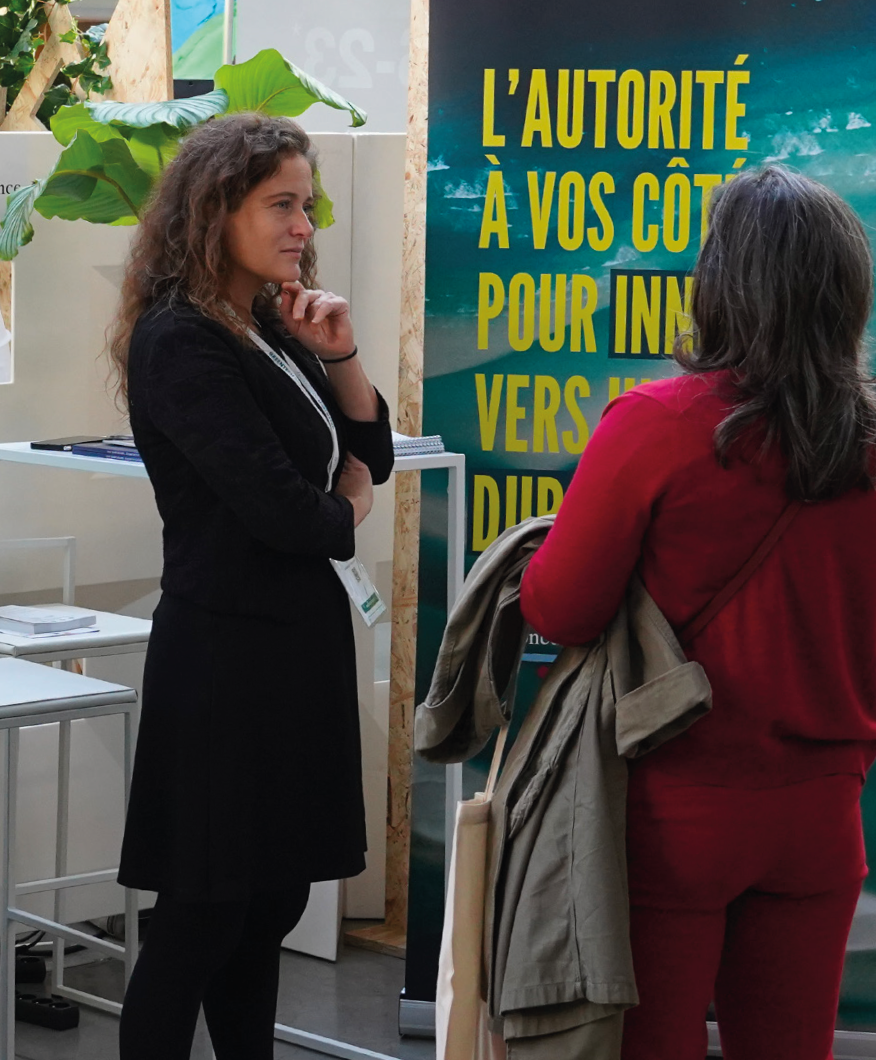ECOLOGICAL TRANSITION
Promoting sustainability

Sustainability is a key priority for the Autorité, which is pursuing its commitment to the ecological transition in all aspects of its work. In particular, the Autorité is stepping up its efforts to detect anticompetitive practices that are the most harmful in terms of sustainability, while combining its firm stance with support for undertakings wanting to pursue virtuous sustainability-related projects. An update on significant advances and what’s next.
An essential commitment to the energy transition
The Autorité wants to contribute to sustainability by protecting the competitive process, which is a source of innovation, increased quality and diversity of products and services, and efficient use of resources. Sustainability considerations have become major concerns for public authorities and civil society alike and are permeating economic activity, becoming additional parameters of competition between undertakings. They must therefore be taken into account in the actions of the Autorité, in accordance with its mandate under the law.
A procedural framework to secure virtuous business initiatives
In view of the specificities and major challenges involved in bringing sustainability issues within the scope of competitive analysis, the Autorité has decided to adopt an “open door” policy, inviting undertakings that wish to develop virtuous sustainability-related projects to submit their projects to the General Rapporteur, who may issue informal guidance as to their compatibility (or non-compatibility) with competition law.
In order to support undertakings in their efforts, the Autorité wanted to offer a flexible procedural framework. To that end, the Autorité prepared a notice, which – following a large public consultation – was published on 27 May 2024. The notice is based on the chapter of the new European Commission horizontal guidelines dedicated to sustainability agreements, while taking a broader scope that covers all competition-related matters, with the exception of mergers.
TIME-OUT: COMPLIANCE
See the “Sustainability” section on our website.
An antitrust case setting boundaries not to be crossed
Following the example of the floor coverings cartel sanctioned in 2017, in which cartel members agreed to not compete on the environmental performance of their products, in 2023 the Autorité sanctioned a cartel in the so-called “Bisphenol A” (BPA) case.
Three professional organisations and 11 companies (Andros, Bonduelle, Charles & Alice, Cofigeo, Conserves France, D’Aucy, General Mills and Unilever, as well as can suppliers Ardagh, Crown and Massilly) were fined a total of nearly €20 million for failing to compete on an environmental and health competition parameter, i.e. the presence or absence of BPA, which is considered a potential endocrine disruptor, in containers in contact with food (cans, tins, etc.).
In its November 2023 opinion on mobility, the Autorité stressed that opening up to competition could clearly accelerate the ecological transition of transport.
The case illustrates the potential temptation for certain companies to collude to delay the adoption or application of standards that could have beneficial effects on public health and the environment. The Autorité considered the practices to be very serious, as they meant that consumers were unable to choose BPA-free products, at a time when they were available and when BPA was already considered dangerous to health.

The Autorité attended the MeetUp Greentech at Station F on 7 and 8 November 2023.
Targeted sector-specific inquiries
The priority given to sustainability is also reflected in the areas in which the Autorité decides to launch inquiries ex officio. Most of the latest sector-specific inquiries are concerned with sustainability (or at the very least include a sustainability component).
Mobility opinion
While the European Green Deal calls for greenhouse gas emissions to be reduced by 55% by 2030 compared with 1990 levels, and for climate neutrality to be achieved by 2050, the transport sector needs to evolve to reduce its negative impact on the environment. With the Green Deal setting an objective for Member States of a 90% reduction in transport-related greenhouse gas emissions, transport policy must be seen through the prism of sustainability. At the national level, the transport sector is the largest greenhouse gas emitter, accounting for 31% of emissions in France in 2019.
Policies aimed at opening up public transport to competition were quick to incorporate the issues of sustainability and the fight against climate change. Competition policy contributes to sustainability insofar as competition can help to improve the transport offer for passengers and make mobility, in its less polluting forms, more attractive for consumers, which is likely to encourage a modal shift.
In contracted urban transport markets, the introduction of environmental criteria in calls for tender issued by mobility authorities can encourage players to intensify their innovation. For example, in a call for tender, the Hauts-de-France region selected a carrier that proposed an ambitious ecological offer (80% of the fleet “greened”). From 23 August 2026, it will be mandatory to include at least one environmental criterion in the award criteria for public procurement contracts.
Given their importance, the Autorité also considered that sustainability objectives, and the intermodality that contributes to them, could be more clearly integrated into the missions of the sector-specific regulator, the French transport regulator (Autorité de régulation des transports – ART), by introducing a more explicit legal basis. With that in mind, the Autorité recommended that the legislator amend the French Transport Code (Code des transports) to ensure that the ART’s missions are consistent with the overall objectives of France’s transport policy, which include environmental protection and regional development. In 2024, working closely with the ART, the Autorité will follow up on the recommendations made in its opinion.
Opinion 23-A-18 of 29 November 2023

Sector-specific inquiry on electric vehicle charging stations
With the same aim of achieving carbon neutrality by 2050, in line with the Paris Agreement, the European Commission is planning to ban the sale of new combustion-powered cars by 2035. The development of electromobility is therefore a key factor in the ecological transition of the transport sector. As such, the deployment of a dense and reliable network of electric vehicle charging infrastructure (EVCI) is a sine qua non condition for the growth and sustainability of electric mobility.
These crucial issues raise competition concerns, which is why the Autorité decided to start inquiries ex officio, in order to conduct an in-depth assessment of the competitive situation in the EVCI sector, which is still taking shape. Its opinion primarily concerns the deployment and pricing of EVCI and the creation of associated services, which are key to the decarbonisation of the French economy.
The Autorité made legislative, regulatory and organisational recommendations to supplement the legal framework in which the multiple players operate and to optimise government support for the growing sector. The aim is two-fold, namely to create the right conditions for the emergence of a competitive sector, and to support consumers as they change their consumption habits.
In addition, a number of non-exhaustive potential competition risks are highlighted, which require particular vigilance to maintain competition on the merits and foster innovation, as well as the quality and diversity of the offering in these emerging sectors.
Opinion on product rating systems
Information on the sustainability-related characteristics of the products or services offered to consumers has been on the rise for several years. The information, often provided by rating systems expressed in the form of numbers, letters or colours, aims to enlighten consumers about the characteristics and composition of products. The systems rate various factors such as nutritional quality, environmental impact, energy efficiency and so on. Present in a wide range of sectors (agrifood, cosmetics, textiles, toys, household appliances, interior design and tourist accommodation), the rating systems are developed and distributed by different types of players.
The Autorité has decided to study the competition issues that may arise from the systems and will focus in particular on:
- how the information provided by the rating systems is likely to guide consumer purchasing decisions and thus constitute a parameter of competition;
- whether the systems encourage companies to innovate to create products or services that are more virtuous in terms of sustainability;
- how the systems work and are constructed (type of data used, calculation method, etc.) and how the information is delivered to consumers in the form of a rating;
- the role of the different public and private players involved in developing the systems.
Press release of 22 February 2024

